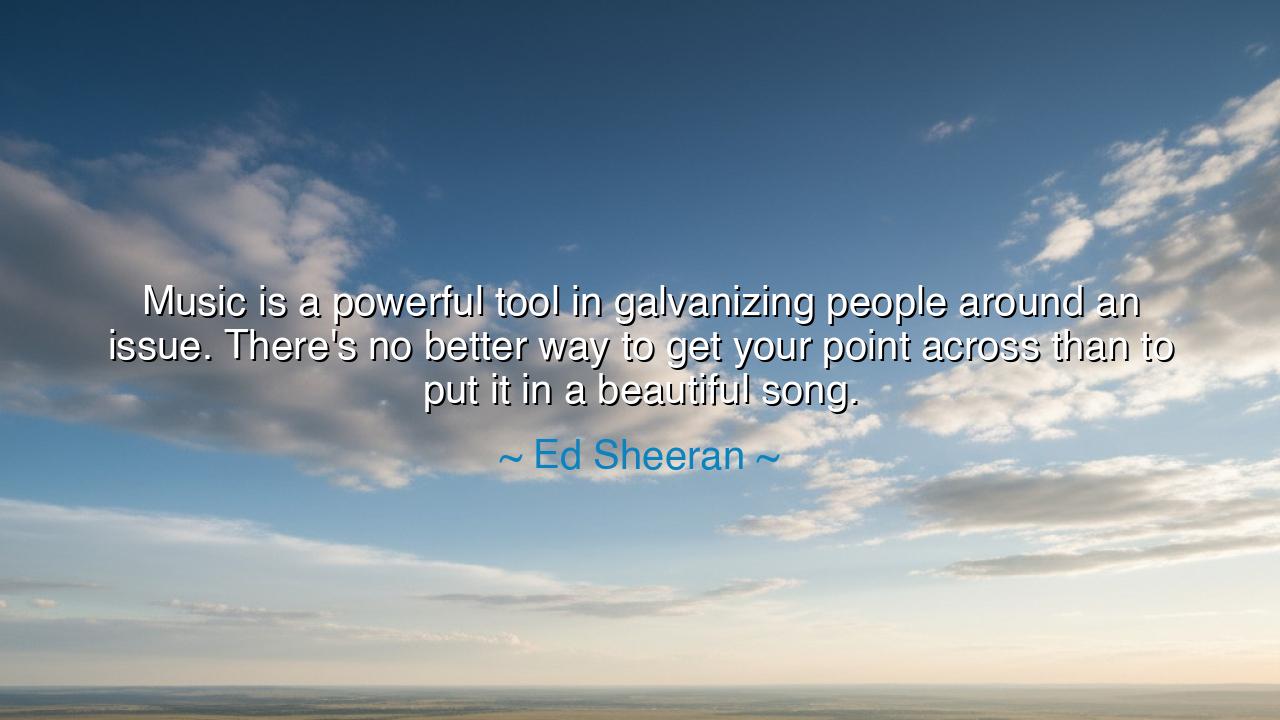
Music is a powerful tool in galvanizing people around an issue.
Music is a powerful tool in galvanizing people around an issue. There's no better way to get your point across than to put it in a beautiful song.






"Music is a powerful tool in galvanizing people around an issue. There’s no better way to get your point across than to put it in a beautiful song." Thus spoke Ed Sheeran, and though his words are simple, they carry the weight of a truth known since the dawn of civilization. For speech can persuade, and action can inspire, but music moves directly into the soul, bypassing the defenses of reason and igniting both the heart and the spirit.
The origin of this wisdom lies deep in human history. When the ancients went to war, they marched with drums and horns, for rhythm gave courage and unity. When they prayed to the divine, they sang hymns, believing melody could carry their petitions to the heavens. In times of sorrow, they raised laments; in times of joy, they danced to songs of celebration. From the very beginning, music has been more than art—it has been the thread binding people together, carrying ideas and passions more powerfully than words alone.
Sheeran’s insight recalls the days of revolution. In the American civil rights movement, songs like We Shall Overcome became more than melodies; they were banners of hope, uniting thousands in courage against oppression. In South Africa, during the struggle against apartheid, music was the heartbeat of resistance, carrying the voices of the oppressed across the world. Such songs did not merely entertain—they galvanized, they emboldened, they proclaimed truths that could not be silenced. This is the power of a beautiful song: to transform an issue into a movement, to turn a cry for justice into a chorus sung by many.
History gives us countless such examples. When Victor Jara of Chile sang for the poor and downtrodden, his voice became a sword of truth. When Bob Dylan strummed his guitar during the turbulence of the 1960s, his words against war and injustice reached millions who might never have read a speech but could not escape the power of his songs. Music, in all these moments, proved itself a greater tool than any weapon, for it united where swords divide, and it softened hearts where arguments harden them.
The meaning, then, is clear: if one wishes to move the world, one must carry their message not only in reason, but in rhythm. For logic can convince the mind, but music stirs the will to act. A speech may fade from memory, but a song, once heard, echoes in the heart for years. The ancient storytellers understood this: they sang their epics so the people would not forget. Sheeran reminds us that the same truth endures—that to bind people to an issue, one must sing it into their souls.
The lesson for us is profound: let us not waste the power of music. Whatever our cause—justice, peace, love, healing—let us weave it into melody. For the world is weary of arguments shouted in anger, but it will always pause to listen to a song. And if that song is beautiful, carrying truth clothed in harmony, it will linger, teaching and inspiring long after the singer has gone.
Practical wisdom calls us: seek the songs that lift your spirit and carry messages of hope. Sing them in your homes, your gatherings, your struggles. And if you can create, write songs of your own—songs that speak of what matters, songs that call for love, for justice, for unity. Let every chord you play, every word you sing, be more than sound; let it be seed planted in the hearts of those who hear.
Therefore, children of tomorrow, remember Ed Sheeran’s wisdom: music is not only entertainment—it is a weapon of light, a banner of truth, a bridge between hearts. When wielded with courage and beauty, it can turn people from bystanders into companions, from listeners into builders of change. So let your song be true, let it be beautiful, and let it be heard—for it may carry the power to change the world.






AAdministratorAdministrator
Welcome, honored guests. Please leave a comment, we will respond soon